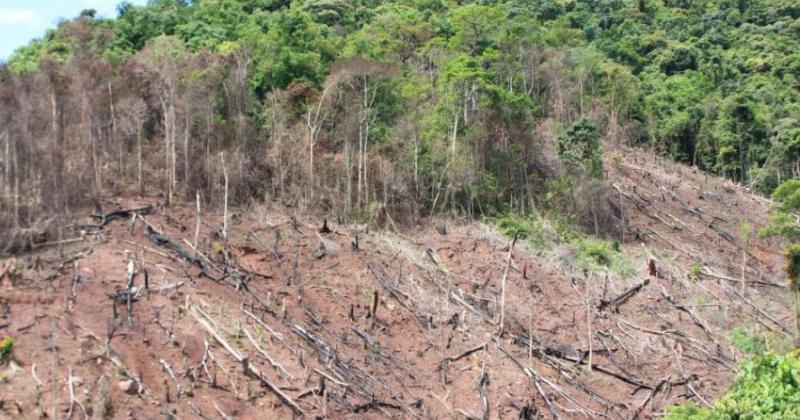Most mornings I have the BBC news on while I’m working, which is how I happened to catch a package with Martin Bashir Monday, September 6, covering Pope Francis’ visit to Madagascar over the weekend, in which the Pontiff issued a strong condemnation of runaway deforestation.
“The deterioration of biodiversity compromises the future of the country and of the Earth, our common home,” Francis said in the presence of Madagascar’s President Andry Rajoelina. “The last forests are menaced by forest fires, poaching, [and] the unrestricted cutting down of valuable woodlands.”
According to Global Forest Watch, between 2001 and 2018 Madagascar lost 3.6 million hectares, the equivalent of 21 per cent of its total forest. Some estimates say it will all be gone by 2040, an especially alarming forecast given that 80 per cent of the species found on Madagascar don’t exist anywhere else on the planet.
So stirring was Francis’ rhetoric that the cardinal on the next stop of his African tour, Maurice Piat in Mauritius, announced that he’s asking local Catholics to help plant 100,000 trees before the end of the year.
Summing things up, Bashir closed by saying that the people of Madagascar had met a pope “who’s as much a conservationist as he is a Christian.”
First of all, kudos to the BBC for dispatching a journalist of Bashir’s stature to cover Francis’s Africa swing, illustrating that the pope’s desire to shine a spotlight on oft-forgotten corners of the planet through his travels actually works.
Yet the apparent contrast Bashir seemed to suggest, if not outright tension, between conservationism and Christianity has it exactly wrong, at least as far as Francis is concerned. Had the pontiff himself been writing the script, no doubt he would have described himself as “a conservationist because I’m a Christian.”
Just as generals sometimes fight the last war, Bashir’s reaction shows that the media sometimes covers the last story. The truth is, the idea that there’s something jarring about Christian conservationism was fashionable in the 1960s and ’70s, but it’s been badly outdated for some time.
Professor Lynn White Jr. of the University of California published an influential article in the journal Science in 1967, in which he blamed the Bible for making Westerners feel “superior to nature, contemptuous of it, willing to use it for our slightest whim.”
Since then, however, the evaluation has shifted dramatically.
Many conservationists today have come to see Christianity as part of the solution to the ecological crisis, not its source. Christianity fosters a sense of humility and restraint, they argue, essential to curbing humanity’s otherwise insatiable appetite for pillaging nature.
Such perceptions have been shaped by papal leadership, well before Francis arrived.
As far back as a 1988 address to the European Court of Human Rights, St. John Paul II referred to “a safe and healthy natural environment” as a positive human right, on a par with rights to health care, education, and a decent standard of living. In his 1990 Message for the World Day of Peace, John Paul urged Christians to realize that concern for Creation is “an essential part of their faith” - in other words, not something optional, but a core aspect of what it means to be a follower of Christ.
In 2001, John Paul located the birthplace of the ecological crisis in the moment when human beings stopped regarding themselves as servants of a Creator-God, and instead set themselves up as “autonomous despots.” Today, the pope said, the human person at long last seems to be “understanding that he must finally stop before the abyss.”
Pope Benedict XVI extended this ecological witness in striking ways, including installing a battery of more than 1,000 solar panels atop the Vatican’s audience hall in order to provide electrical current, light, and heating and cooling via solar energy. He also signed an agreement to make the Vatican the first “carbon-neutral” state in Europe, creating a “Vatican Climate Forest” in Hungary’s Bükk National Park large enough to offset the Vatican’s annual CO2 emissions.
Shortly after his election to the papacy, Benedict XVI warned that creation “is exposed to serious risks from choices and styles of life which can degrade it. Environmental damage makes the existence of the poor of the earth especially unbearable.”
“In dialogue with Christians of other confessions, it’s important that we commit ourselves to taking care of creation,” Benedict said, “without depleting its resources and sharing them in a manner based on solidarity.”
This long-running green revolution in Catholicism has been even more pronounced at the grassroots.
Green Sisters by Sarah McFarland Taylor, a non-Catholic scholar at Northwestern University, documented a decade ago the “pervasiveness and significance of a greening movement” among women’s religious orders. The book introduced readers to sisters who are sod-busting manicured lawns around their motherhouses to create community-supported organic gardens; building alternative housing structures and hermitages from renewable materials; adopting the green technology of composting toilets, solar panels, fluorescent lighting, and hybrid vehicles; and turning their community properties into land trusts with wildlife sanctuaries.
The bottom line is that when Francis stood in the Iavoloha Presidential Palace and thundered away at “excessive deforestation, from which some profit,” he was not innovating. Instead, he was articulating a broad Catholic/Christian thrust that’s been gathering strength for decades.
